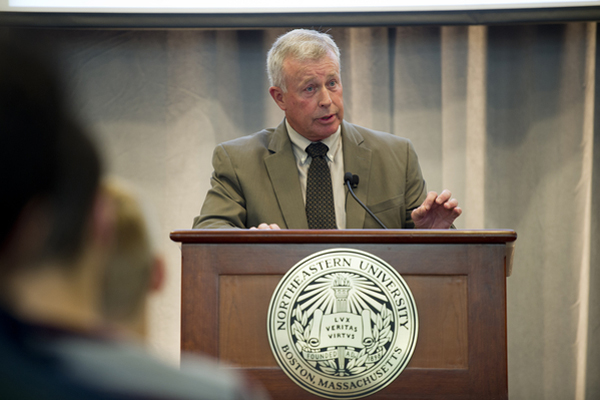The dilemma of U.S. military intervention

Retired Gen. David D. McKiernan, the former commander of U.S. and NATO forces in Afghanistan, used the familiar New England imagery of a lobster pot to describe the ramifications of U.S. military intervention in conflicts on foreign soil.
“Easy to get in,” but “hard to get out,” he told a packed Raytheon Amphitheater at Northeastern University on Thursday evening.
The event, entitled “U.S. Military Interventions, Pre- and Post-9/11,” aligned with Northeastern’s commitment to national security and the goal of fostering discussions of great global importance. It was co-sponsored by the Office of the President and College of Social Sciences and Humanities.
Throughout the 90-minute, candid discussion McKiernan stressed that U.S. military invention should be a last resort in responding to international conflicts. He said American political leaders must also place a greater priority on understanding the history, culture and complex social structure of those regions, in addition to the diversity of people living there. Those steps, he said, weren’t given proper consideration before America sent troops to Iraq and Afghanistan in the wake of the Sept. 11 attacks.
McKiernan urged students in attendance to keep these considerations in mind as they prepare to begin careers in which they’ll be required to make important decisions.
“It requires the intellectual energy of everybody to make good decisions,” he said. “We’ve made some good decisions, and we’ve made some bad decisions. Understanding the environment is key to making those good decisions.” After his lecture, McKiernan fielded questions posed by audience members on topics such as the use of drones in combat, applying lessons learned from past conflicts to current dilemmas and the financial costs of war.
McKiernan, the former commander for the International Security Assistance Force in Afghanistan, entered the Army in 1972 with an ROTC commission and commanded soldiers at every rank from second lieutenant to four-star general. His distinguished 37-year U.S. Army career included service in the Gulf War, Korea, Europe and the Balkans, Southwest Asia, Iraq and Afghanistan.
McKiernan led all ground forces into Iraq during Operation Iraqi Freedom in 2002-03, removing Saddam Hussein and the Baath Party from power with a 160,000 joint and coalition formation. In his final command assignment in 2008-09 in Afghanistan, he was responsible for more than 100,000 soldiers, sailors, airmen, Marines and Special Forces in both a NATO ISAF (including 42 contributing nations) and U.S. Operation Enduring Freedom role.
In his Thursday evening discussion, McKiernan focused on U.S. military interventions in Iraq and Afghanistan, but also touched on Americans’ presence in both military and peace-keeping roles dating back to the Cold War and in places such as Kuwait, Panama and Kosovo.
“It’s a much more complex, ambiguous, divisive world when you decide to go in and intervene somewhere and change the status quo, change the existing order,” he said.
He added, “Unless we’re willing to pledge a sizable of amount of resources to commit military for a long period of time, I’m talking generations, there won’t be a lasting impact, especially if there’s not popular support in the area where we’ve intervened.”

ROTC cadets listen to retired Gen. David D. McKiernan speak Thursday in Raytheon Amphitheater.
Earlier in the day, McKiernan engaged more than 50 people for a seminar-style lecture focused on Afghanistan, which he described as a country with a “mosaic” of people who’ve lived through a history of continual conflict — one that has traumatized its social fabric and bred a culture of violence.
The seminar’s audience comprised of faculty, staff, ROTC cadets, members of the Student Veterans Association and undergraduate students in the “International Conflict and Negotiation” course taught by Kimberly Jones, faculty associate in the Middle East Center for Peace, Culture and Development and head adviser in the International Affairs program and Middle East Studies.
At the afternoon discussion, Georges Van Den Abbeele, founding dean of the College of Social Sciences and Humanities, highlighted McKiernan’s distinguished career and welcomed him back to campus. McKiernan served as the keynote speaker at Northeastern’s Veterans Day ceremony in 2011 honoring those who have served and protected our country.
Van Den Abbeele also noted Northeastern’s commitment to leadership in national-security efforts, including its longstanding commitment to the ROTC program.
“I saw first hand the tremendous expertise and experience General McKiernan can bring to the university community, and particularly to the College of Social Sciences and Humanities, when I heard him speak on campus last fall,” Van Den Abbeele said. “He did not disappoint in Professor Jones’ class this morning. Our students had the unique opportunity to learn from and engage with one of the most distinguished commanders of our times, a strategic thinker whose grasp of the global challenges we face today is simply unparalleled.”





